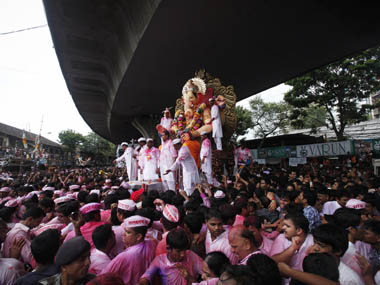Could this be real? Imagine this in Mumbai, New Delhi and all other cities: Everyday citizens get stuck in traffic snarls, patients languish in ambulances that cannot find a way to reach hospitals, entire neighbourhoods having to suffer because of a festival, a marriage procession or a political rally. Easily done. Now imagine, that these become unconstitutional?! Are you serious? Yes, in Kerala it certainly isn’t a dream. A division bench of the Kerala high court on Thursday declared all roadside meetings “unconstitutional”. Justices CN Ramachandran Nair and Babu Mathew P Joseph declared Section 5(1) (c) of Kerala Public Ways (Restriction of Assemblies and Processions) Act of 2011 void. [caption id=“attachment_255614” align=“alignleft” width=“380” caption=“Devotees carry an idol of Lord Ganesh during a procession on the last day of the Ganesh Chaturthi in Mumbai. Reuters”]  [/caption] Section 5 of the Kerala Public Ways (Restriction of Assemblies and Processions) Act, which allows roadside meetings for religious or national festivals and for public assemblies or demonstrations, is a complete negation of section 4, which prohibits obstruction of public ways, said the court The court clearly sees the police as being impotent when it comes to preventing such gatherings. “It is reported that permissions were recklessly granted by district police chiefs who cannot be realistically expected to show the courage to reject a single application from any political party or trade union,” the bench observed. The Kerala High Court ruling is one that will be welcomed by citizens of Kerala, and one that should be copied across the country – but let’s not celebrate yet. What happens if a political party or a religious community decides to break the law and take out a procession or hold a meeting by the roadside? How many citizens would have the courage to file a complaint with the police officials – and how many police officers would have the courage to act against such complaints? The court has noted that even senior officers, including district police chiefs “cannot be realistically expected to show the courage to reject a single application from any political party.” If this is the case — and it could be the case across the country, not just in Kerala — the ruling could be another instance of a court ruling that is ignored for the most part. Take a city like Mumbai, where illegal banners and hoardings are common and prolific, despite court orders banning them. For a ruling like the Kerala High Court one to succeed, sadly, there needs to be political will to make sure that it is effective. Otherwise, it’s just another ruling that makes for a great headline, rather than affords the citizen great relief.
A division bench of the Kerala high court on Thursday declared all roadside meetings “unconstitutional”.
Anant Rangaswami was, until recently, the editor of Campaign India magazine, of which Anant was also the founding editor. Campaign India is now arguably India's most respected publication in the advertising and media space. Anant has over 20 years experience in media and advertising. He began in Madras, for STAR TV, moving on as Regional Manager, South for Sony’s SET and finally as Chief Manager at BCCL’s Times Television and Times FM. He then moved to advertising, rising to the post of Associate Vice President at TBWA India. Anant then made the leap into journalism, taking over as editor of what is now Campaign India's competitive publication, Impact. Anant teaches regularly and is a prolific blogger and author of Watching from the sidelines. see more


)

)
)
)
)
)
)
)
)



